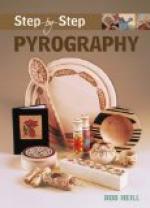David took the clay group in his hand, turned it about, whistled softly. “Wha owns this bairn?” he inquired.
“Howel’s his father,” said Roger. “He’s quite good to him—unless he’s drunk. Then he pounds him. He hates to have Gwillym make images; he thinks it’s witch-craft. Gwillym made an image of him once and the leg broke off, and that very same day Howel’s donkey kicked him and made him lame for a week.”
“There’s ower mony gowks in the land for a’ the mills to grind,” said David, and that was all they could get out of him. They knew he was interested or he would not have been so Scotch. David could speak very good English, and did as a rule, but with Eleanor and Roger he often returned to the speech of his boyhood because they liked it so much.
They liked David exceedingly. He had seen more interesting things than any one else they knew. He showed Roger how to make a fish-pond, and he told Eleanor how the Saracen city in her tapestry ought to look. He had himself been a slave among the infidels, and the children heard his adventures with awe and delight. Eleanor loved the story of the bath-pavilion like a tiny palace, built by the emir for the lady Halima, and the turning of the course of a river to fill her baths and her fountains, and water her gardens. Roger’s hero was the young English merchant who had escaped by swimming, under his master’s very nose. If one could have such exciting experiences it seemed almost worth while to be a captive of the Moslems. But when Roger said so, David smiled a dry smile and said nothing.
But it was of King Solomon that he spoke most, and he seemed to have the sayings of the wise king all by heart. A Hebrew physician whom he had once known used, he said, to write one of Solomon’s proverbs on the lid of every box of salve he sent out.
“You follow his wisdom, Master Roger,” David said one day, “and you’ll see how to build ye a house or a kingdom. ’Envy thou not the oppressor and choose none of his ways,’ he says. ’Withhold not good from them to whom it is due, when it is in the power of man to do it,’ he says. ’God shall bring every work into judgment with every secret thing, whether it be good or whether it be evil.’
“I tell ye,” David added, glancing from the trim gray wall of the lychgate up to the castle on the hill, “every day’s judgment day wi’ a builder—or the head of a house.”
Thus the stonemason was touched more deeply perhaps than he would have owned, by the likening of his face to that of Solomon in the clay figures of little Gwillym ap Howel.
As the work on the church progressed three friends of David’s journeyed from Salisbury to see him. They had come from Lombardy a long time ago, when they were Piero, Andrea and Gianbattista. At Avignon they were known as Pierre, Jean-Baptiste and Andre, and in Spain they were rechristened Pedro, Juan and Andres. Now they were called Peter, Andrew and John,—and sometimes the Apostles. Peter understood vaulting; Andrew could carve a stone image of anything he saw, and John had great skill in the laying of pavements. They talked of cathedrals and palaces with a familiarity that took one’s breath away.




